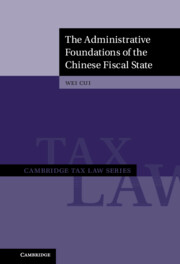Book contents
- The Administrative Foundations of the Chinese Fiscal State
- Cambridge Tax Law
- The Administrative Foundations of the Chinese Fiscal State
- Copyright page
- Dedication
- Contents
- Figures
- Tables
- Acknowledgments
- Abbreviations
- Introduction
- 1 The Forgotten Reform
- 2 What Is an Audit?
- 3 Atomistic Coercion
- 4 Returning Responsibilities to Taxpayers
- 5 Organizing Revenue
- 6 Policy Making without Information
- 7 The Rhetoric of Law
- 8 Varieties of State Capacity
- 9 Pivoting Away from the Rule of Law
- References
- Index
3 - Atomistic Coercion
Published online by Cambridge University Press: 24 March 2022
- The Administrative Foundations of the Chinese Fiscal State
- Cambridge Tax Law
- The Administrative Foundations of the Chinese Fiscal State
- Copyright page
- Dedication
- Contents
- Figures
- Tables
- Acknowledgments
- Abbreviations
- Introduction
- 1 The Forgotten Reform
- 2 What Is an Audit?
- 3 Atomistic Coercion
- 4 Returning Responsibilities to Taxpayers
- 5 Organizing Revenue
- 6 Policy Making without Information
- 7 The Rhetoric of Law
- 8 Varieties of State Capacity
- 9 Pivoting Away from the Rule of Law
- References
- Index
Summary
The revenue management system engenders non-rule-based tax collection. The strongest concern they raise is not corruption, but the conversion of what would have been compliant taxpayers into “semi-compliant” ones, i.e. compliant with the dictates of government employees rather than the requirements of law. I lay out a conceptual framework for analyzing the revenue management system, captured by “atomistic coercion.” “Atomism” means that (i) instead of a government organization, the authorities that taxpayers obey are individuals; and (ii) tax collectors acquire taxpayer information that they need not share with the state apparatus. “Coercion” conveys the idea that taxpayers perform compliance activities only because they are monitored by government authorities, not because of some social norm of complying with the law. Coercion secures compliance through government observation and intervention. Intervention can secure compliance along behavioral margins that are accurately observed. But as the state’s powers of observation and intervention are bounded, compliance can prove very low along the vast portions of taxpayer behavior not observed by the state or where the state’s capacity for intervention is constrained. This is illustrated by several examples, most importantly the phenomenon of taxpayers formally registering with tax authorities while dodging most specific compliance obligations.
Keywords
- Type
- Chapter
- Information
- The Administrative Foundations of the Chinese Fiscal State , pp. 89 - 118Publisher: Cambridge University PressPrint publication year: 2022



